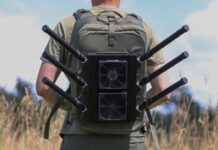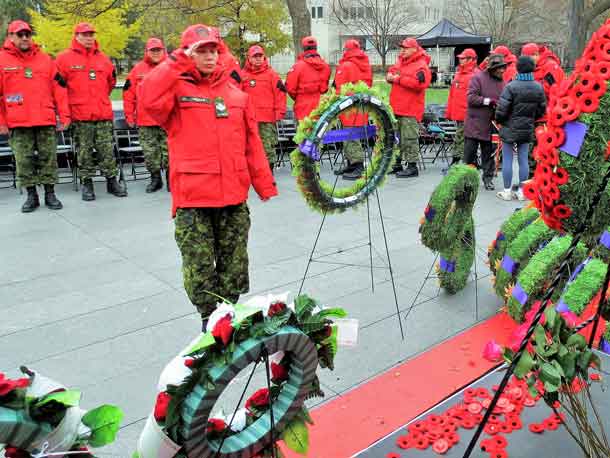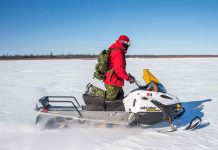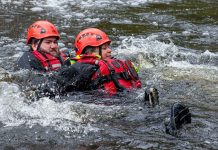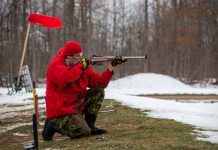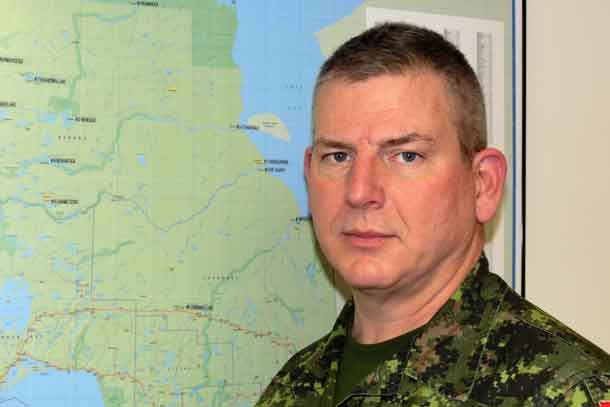
THUNDER BAY – Canadian Rangers and civilians from Cree communities along the Ontario sides of James Bay and Hudson Bay who went to join a massive search for four lost hunters from Waskaganish, a small Cree community on the Quebec side of James Bay, have been praised for their efforts.
“The community and council of the Cree Nation of Waskaganish are very grateful for the support and experience that was offered to us in our recovery efforts,” said Chief Darleen Cheechoo.
The four hunters went missing on October 17 when they left the community by boat. The first body and their boat were found the next day when it was spotted by a Royal Canadian Air Force search aircraft. The military then discontinued its air search because it was assumed the three remaining hunters were dead.
But the people of Waskaganish continued the search and appealed for help in recovering the remaining bodies. Rangers from Ontario responded as unpaid civilian volunteers, along with numerous civilians.
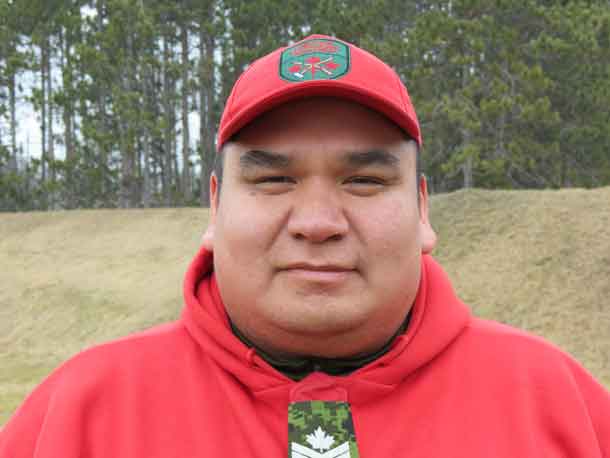
Sergeant Matthew Gull, commander of the Ranger patrol in Peawanuck, said he went to Waskanaganish “because, for me, it was the right thing to do. I’ve been trained by the army and the Ontario Provincial Police in search and rescue and I’ve done a lot of searches over the years. I couldn’t sit back and just watch. I did it as a Cree, too.
“We were about to have (Exercise Ranger) Tracker, a major search and rescue exercise, and yet something real was happening just across the bay, where people were asking for our help. I wanted to help them. So I, along with other Rangers, went as a volunteer.”
The Mushkegowuk Council, which represents seven Cree First Nations in Ontario, and the Moose Cree First Nation at Moose Factory organized charter flights for Cree from Ontario to fly to Waskaganish to join the search.
“I think there’s a cultural difference as to how First Nations people relate to the loss of loved ones in these types of tragedies,” Chief Cheechoo said. “For us, it’s so important to bring home our people, regardless of time and effort. We feel we are not successful until each of our loved ones is back in our community.”
She said her people could not understand it when the military withdrew its search assistance when it became clear the missing hunters were dead. The people of Waskanaganish, she said, organized a massive search on their own, often having more than 100 people involved in the search on a given day.
Sergeant Gull arrived in Waskanaganish and used his military training and experience to suggest changes in the operation of the search command centre. The body of a second hunter was found the same day. “I was impressed by him,” Chief Cheechoo said. “I was impressed by his professionalism. He was a big help.”
The small community with its population of 2,000 did not have the resources to maintain the search, Chief Cheechoo said, so she wrote a letter asking the Canadian Armed Forces to renew its support for the search for the bodies of the two remaining hunters. Grand Chief Jonathon Solomon of Mushkegowuk Council also wrote asking for military help. Their letters reached the top of the military hierarchy, she said, and the Rangers of Quebec were placed on active duty to support the search.
The Rangers from Ontario who went to the aid of Waskanaganish were retroactively placed on active duty for the time they were involved in the search and paid accordingly.
Lieutenant-Colonel Matthew Richardson, commanding officer of the Rangers in Ontario, said he monitored the search in Waskanaganish closely. As a result, he said, the Rangers in the Cree communities in Ontario were excused from participating in Exercise Ranger Tracker and freed to travel to Quebec as unpaid civilian volunteers if they wished to.
“Waskaganish is in Quebec, another province,” he said, ‘But it’s in James Bay and so the Ontario Cree communities on James Bay are closely related. They wanted to go and help their brothers across the bay. We released them from the training exercise so that they could go as volunteers and take their Ranger skills with them. Those skills were quickly recognized when they got there and put to good use. I think they added some structure to the search and to the command post.
“It really ended up as a joint effort from Ontario to help, the Mushkegowuk Council, Moose Cree First Nation, and from our Rangers.
“The next time it might be one of our Cree communities asking for help from (the Rangers in Quebec) to come and help them.”
The search for the bodies of the two remaining hunters was discontinued on its 25th day on November 12 because the onset of winter weather made searching no longer possible.
(Sergeant Peter Moon is the public affairs ranger for 3rd Canadian Ranger Patrol Group at Canadian Forces Base Borden.)

